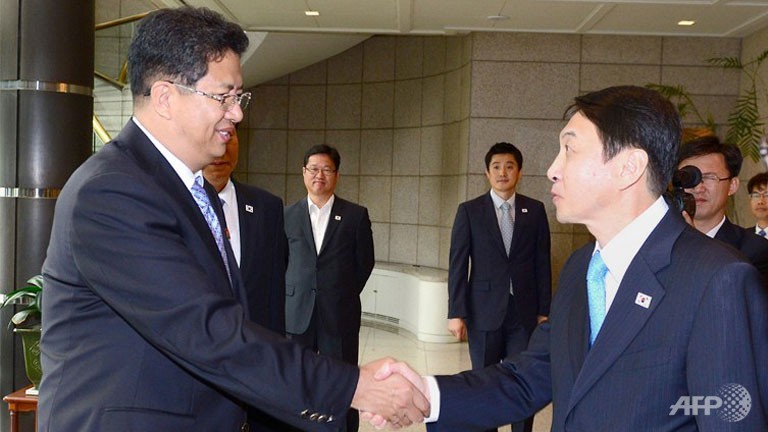by TONY KIM
Though sports is often seen as a way to offer nations in conflict a way of reaching across the aisle, a recent breakdown in talks between North and South Korea over the upcoming Asian Games dealt a bit of a setback to the goals of sports diplomacy.
The North Korea delegation participating in talks with the South over the 2014 Asian Games to be hosted in Incheon, South Korea, reportedly walked out of the most recent session, accusing its Korean counterpart of being insincere, according to a report in the Korea JoongAng Daily.
“North Korea was not happy with the way the talks were conducted,” an official from the Unification Ministry was quoted as saying by the South Korean newspaper.
The first round of talks, proposed by North Korea, focused on logistical issues, such as transportation methods and determining the size of the athletic and cheerleading team Pyongyang wound send to the event.
Yesterday, Kwon Kyung-sang, secretary general of the Incheon Asian Games Organizing Committee, and Son Kwang-ho, vice chairman of North Korea’s Olympic Committee, met in Panmunjom, a village located in a demilitarized zone, as part of their respective three-member delegations. Not only did the two sides fail to hash out an agreement, North Korea’s state news agency KCNA indicated the country is considering boycotting the event. North Korea had planned to send 700 athletes and cheerleaders to Incheon.
One of the main points of controversy was choosing an agreeable transportation method for the athletes and cheerleaders. Traveling by boat may be ruled out, since South Korea has prohibited North Korean vessels from entering its waters after the North allegedly sunk the South’s Cheonan warship in May of 2010. The North’s officials have long maintained they were not responsible, though an investigation by the South implicated them.
Another possible issue may have been South Korea’s unwillingness to pay for the North’s travel expenses as it did during the Sunshine Policy administrations of former Presidents Kim Dae-jung and Roh Moo-hyun, according to the Ministry of Unification. The ministry suggested that the South this year would only a pay a portion, an amount that abides by international regulations for less-developed countries.
Additionally, the size of North Korea’s flags has also reportedly been an issue, as the South Korean delegates declared them to be too large. According to AP, an anonymous South Korean official said the objections were out of concern for the safety of the North Korean cheerleaders.
A follow-up meeting has not been set by either side to further discuss logistics of the Asian Games, which begins on Sept. 19.
Photo via AFP







